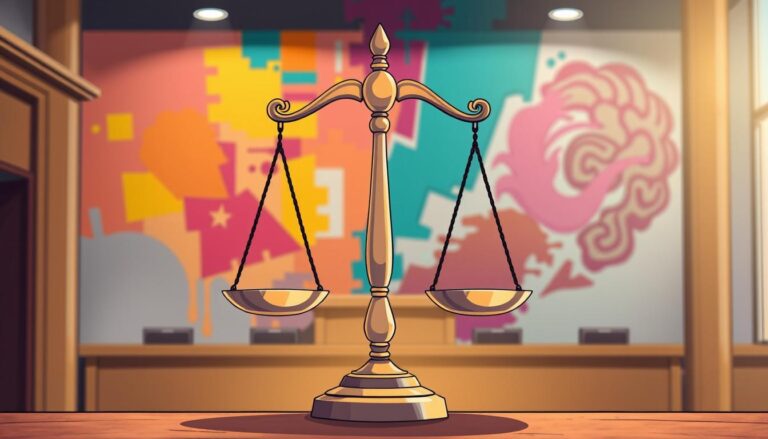Cultural Competency in Law
In today’s world, where people from different races and ethnicities are common, the legal field must adapt. It’s crucial to understand cultural competency and its importance in law. Let’s dive into how cross-cultural understanding is changing legal practice.
The legal world is changing fast. In the U.S., 66% of people have faced a legal issue in the last two years. But, only about half of them got help from a lawyer or legal aid. This shows how important it is for lawyers to be culturally competent.
By improving their ability to communicate with people from different backgrounds, lawyers can show the value of their services. This is key to reaching out to a more diverse client base.
Understanding Cultural Competency in Legal Practice
In the legal world, knowing about cultural differences is key. It helps lawyers serve clients from all walks of life well. This understanding leads to a fairer and more inclusive workplace. It also means better communication and results for clients.
Defining Cultural Components in Law
Cultural competency in law means getting how clients live their lives. This includes their language, traditions, and more. Lawyers need to know these differences to ensure fairness for everyone.
Role of Cultural Awareness in Legal Services
Being culturally aware helps lawyers gain trust from their clients. For instance, eye contact means different things in different cultures. Knowing this helps create a space where clients feel valued and open up.
Impact on Client-Attorney Relationships
Not getting cultural differences can cause problems. It can lead to misunderstandings and mistrust. But, when lawyers respect their clients’ cultures, they build strong relationships and better outcomes.
“In the U.S., when paired with another American at random, there is a 61.1% chance that the other person will be of a different race or ethnicity, indicating increasing diversity in the population.”
| Statistic | Value |
|---|---|
| Individuals Reporting a Legal Issue in the Past 2 Years | 66% |
| Individuals Seeking Help from a Lawyer or Legal Aid | Less than 50% |
By being culturally sensitive, lawyers can build trust. They improve communication and offer fair legal services to diverse clients.
The Evolution of Legal Cultural Competency
The legal world is changing to serve a more diverse society. In 2022, the American Bar Association (ABA) made a big step. They now require law students to learn about anti-racism and cross-cultural training before they graduate. This shows how important cultural understanding is in law.
UC Berkeley’s law school also made a change. They now require students to take at least two classes about race and law. These steps show the legal field’s new way of working with clients from different backgrounds.
Cultural competency means knowing and respecting different cultures, races, and ethnicities. In law, it’s key for good communication and trust between lawyers and clients. It also helps ensure legal services are fair for everyone.
“Cultural competence in professions like law can be the difference between winning or losing a case, as well as between healing or hurting a person.”
The National Center for Cultural Competence says equal access and fairness are key. Lawyers who understand and value their clients’ differences can build trust and respect. This is vital for effective legal help.
The legal field is moving towards greater cultural understanding. This change is because of more diversity and the need for fair systems. As people from different races and ethnicities become more common, lawyers must adapt to serve them better.
Building cultural competency in law means valuing diversity and learning to communicate well with people from different backgrounds. This is crucial for the legal profession to keep its promise of justice. It ensures everyone, no matter their culture or ethnicity, gets quality legal help.
Cultural Competency in Law: Core Principles and Applications
In the legal world, cultural competency is key. It means being able to communicate well across cultures, building trust, and following ethical rules. Lawyers need to learn how to handle cultural differences and recognize their own biases. This way, they can better understand their clients and help them more effectively.
Cross-Cultural Communication Skills
Good cross-cultural communication is vital in law. Lawyers must pay attention to cultural details like body language and language barriers. By listening well and being aware of their own biases, they can have deep conversations and gain their clients’ trust.
Building Trust Across Cultural Boundaries
Trust is essential in the lawyer-client relationship, especially when there are cultural differences. Lawyers need to respect and understand their clients’ cultures. Showing humility and a real interest in their clients’ views helps create a welcoming space for open communication.
Ethical Considerations in Diverse Practice
Legal professionals have to think about the cultural impact of their work. This includes making sure everyone has equal access to legal help, keeping secrets, and fighting for their clients’ rights while respecting their culture. By being culturally sensitive, lawyers can offer top-notch legal help that meets their clients’ needs.
By following the principles of cultural competency, lawyers can better serve a diverse client base. This leads to stronger relationships and more fair legal outcomes.
Diversity Statistics in Modern Legal Practice
The legal field in the United States is still not diverse. It doesn’t match the country’s population. In 2021, the American Bar Association found that only 5% of lawyers were Black. Latinx lawyers made up 6%, and Asian lawyers 5%. Women made up just 38% of all lawyers.
This shows we need more cultural understanding in law. Lawyers must serve clients from different cultures. Without enough diversity, it’s hard to give fair and effective legal help.
| Demographic | Percentage of U.S. Lawyers (2021) |
|---|---|
| Black Attorneys | 5% |
| Latinx Counsel | 6% |
| Asian Lawyers | 5% |
| Women Attorneys | 38% |
The lack of minority representation and ethnic disparities in law is a big issue. We need to focus on cultural competency in law school and practice. This helps lawyers understand and respect different cultures. It leads to better client relationships, communication, and legal services for everyone.
“The legal profession has a long way to go in achieving true diversity and inclusion. Addressing ethnic disparities and legal profession demographics must be a top priority for the industry.”
Building Trust Through Cultural Understanding
Building trust is crucial in the legal field. Knowing cultural differences helps create strong client-attorney bonds. Strategies for trust include engaging clients, conducting legal talks, and clear communication.
Client Engagement Strategies
Showing your diverse client base on your website and in ads makes them feel included. Also, being aware of cultural norms like handshakes or personal space shows respect and comfort.
Cultural Sensitivity in Legal Consultations
Adjusting your talk to match the client’s culture improves understanding and trust. This might mean using simple language, avoiding legal terms, or offering translation services. Showing real interest in their culture builds rapport and shows your dedication to culturally sensitive legal help.
Breaking Down Communication Barriers
Good cross-cultural communication is key to trust and positive client relationships. By listening well, being open to feedback, and using cultural awareness, you can overcome language or cultural hurdles. This ensures your clients feel understood and heard during legal matters.
“Lawyering is not culturally neutral,” as highlighted by legal scholar Susan Bryant, emphasizing the importance of understanding and respecting cultural differences in the legal profession.
Language Access and Legal Services
Ensuring language accessibility is key in the legal field. Lawyers must communicate well with clients who may not speak English fluently. They use interpreters or offer services in many languages. This is especially important in diverse communities where lawyers must meet unique client needs.
In Fruitvale, Oakland, some law offices have staff who speak many languages. They include Spanish, Portuguese, English, and Mam (a Mayan language). This diversity helps bridge the communication gap between lawyers and clients, leading to better legal help and outcomes.
Language barriers can greatly affect defendants, witnesses, and litigants who don’t speak English well. Professional interpreters and translators are crucial. They ensure clear communication in legal settings, keeping cultural nuances and contexts intact.
Legal institutions can improve by investing in language access. They can develop language plans, assess staff language skills, and work with language service organizations. This helps serve diverse communities better.
By focusing on cultural competency and language access, the legal field can create a more just environment. It fosters trust, respect, and clear communication. This leads to fair and just outcomes for everyone.
“Language access is not just a legal requirement, but a moral imperative to ensure everyone has equal access to justice.”
Cultural Competency Training in Law Schools
Law schools are now focusing more on cultural competency training. This is because lawyers need to work with people from different backgrounds. They want to make sure future lawyers can handle these interactions well.
Current Educational Requirements
Places like the University of California, Berkeley School of Law, are making students take courses on race and law. The American Bar Association (ABA) also has a new rule. Starting in Fall 2023, law students will have to learn about anti-racism and cross-cultural training.
Implementation of Cross-Cultural Programs
These programs aim to make lawyers more aware of different cultures. They include language classes, lectures, and workshops. The goal is to help lawyers understand and connect with people from various backgrounds.
Future of Legal Education
The legal field is changing, and so is legal education. A framework by professors Susan Bryant and Jean Koh Peters is helping. It teaches students and lawyers how to be more culturally aware.
| Key Insights | Implications |
|---|---|
| Cultural competence training is not systematically offered in legal education, unlike in the medical field. | Lawyers, especially those working in pro bono settings or with international clients, would benefit from increased cross-cultural competency. |
| The ABA is considering revisions to its Accreditation Standards for Law Schools to include mandatory training in “bias, cross-cultural competency, and racism.” | These changes could result in a more crowded law school curriculum, potentially reducing the diversity of law schools’ missions. |
The legal field is recognizing the value of cultural awareness training and cross-cultural programs. This change will shape the future of legal education. It will prepare lawyers to serve diverse communities better.
Addressing Implicit Bias in Legal Practice
In the legal field, it’s key to spot and reduce unconscious bias. Lawyers need to know their own biases to serve fairly and justly. This fairness is not just in obvious areas like criminal law or voting rights. It also applies to fields like intellectual property and employment law, where culture and race matter a lot.
The legal world is slow to catch up with other fields like medicine and social work. These fields understand the need to know about culture and bias to talk well with clients. But the legal field hasn’t focused as much on these issues.
Teaching cultural humility in law school and in legal practice can help lawyers respect clients’ cultures. This way, they can talk better and reduce bias. The American Medical Association and the National Association of Social Workers have rules about bias. But the legal world needs its own rules to deal with cultural competence and bias.
For the last 20 years, research has been growing on bias in law. Lawyers work with clients from many backgrounds, which can make communication hard. It’s important to tackle this issue to make the justice system fairer and more diverse.
“The legal profession lags behind other professions like medicine and social work in adopting measures to mitigate the effects of cultural bias on service delivery.”
Multicultural Legal Practice Management
Today’s legal practices must value diversity and inclusion to succeed. They need to create welcoming work environments for all clients. This means hiring staff that looks like the clients, building an inclusive culture, and tailoring services to meet different needs.
Staff Diversity and Inclusion
Law firms must have a team that reflects the communities they serve. This means hiring people from diverse backgrounds, like Black, Hispanic, and Asian individuals. Natalia Vieira Santanna’s law office in Fruitvale, Oakland, is a great example. They have a multilingual staff to help their immigrant clients.
Creating Inclusive Legal Environments
It’s not just about hiring a diverse team. Law firms must also create an inclusive culture. This includes cultural awareness training, celebrating diverse holidays, and encouraging open talks about cultural differences. Studies show inclusive workplaces do better financially and attract new clients.
Client Service Adaptation
Law firms must also adapt their services to meet diverse client needs. This might mean offering language interpretation, respecting cultural communication styles, and creating special legal services. By being culturally sensitive and adaptable, firms can build strong, trusting relationships with clients from all walks of life.
Source Links
- Why Cultural Competency is a Must-Have Skill for Growing Law Firms
- Cultural Competency: A Necessary Skill for the 21st Century Attorney
- An Argument for Cultural Competency Training in the Legal Profession – Contra Costa County Bar Association
- The Importance of Cultural Competency in the Legal Industry! – YLCC
- Cultural Competency in the Practice of Law
- How Cultural Competency Can Open New Markets for Attorneys
- How lawyers and law schools are grappling with cultural competency
- NCCC: Curricula Enhancement Module Series
- Welcome to the Oregon State Bar Online
- Microsoft Word – 02 Tully Website.docx
- Diversity in Law Schools: Its Importance and Impact on Your Career | Leland
- What is Cultural Competence and How to Develop It?
- Cultural Competency and Healing Trauma in the Criminal Justice System
- Cultural Competence: A Legal Mindset
- Language Access & Cultural Sensitivity
- Language Access in the Legal System | Blog
- Cultural Competency Training: Preparing Law Students for Practice in Our Multicultural World – UCLA Law Review
- Cross Cultural Competency as a Learning Outcome
- Addressing Cultural Bias in the Legal Profession | N.Y.U. Review of Law & Social Change
- Addressing Cultural Bias in the Legal Profession
- 5 Ways Attorneys Can Increase Their Cultural Competence
- Habits of cross-cultural lawyering
- Cultural competence: An essential skill in an increasingly diverse world







